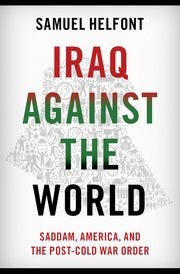Iraq Against the World
Samuel Helfont mines the Iraqi archives of Saddam's international information warfare
Samuel Helfont, Iraq Against the World: Saddam, America, and the Post-Cold War Order (Oxford University Press 2023)
Two decades ago, I spent a lot of time doing research on the sanctions on Iraq. I interviewed officials from the United Nations and most of the key member states, as well as anti-sanctions activists in both Western countries and across the Arab world. That research, which ultimately informed my book Voices of the New Arab Public, brought me into contact with a lot of smart, passionate and engaged people who were morally outraged by the effects of the sanctions on the Iraqi people. It also brought me into contact with a lot of people whose intentions seemed a bit less pure, and with more than a few who seemed either downright mercenary or highly politically motivated. My research focused on the Arab world, where the human costs on Iraqi civilians and political resentment of the United States (framed and encouraged by the then new Qatari satellite television station al-Jazeera’s coverage) helped turn the sanctions into a highly potent pan-Arab mobilizing issue.
In his fascinating new book, Iraq Against the World, Samuel Helfont shines a spotlight on one previously unknown dimension of those anti-sanctions campaigns: the international information warfare waged by Saddam Hussein’s regime in pursuit of the lifting of the sanctions. Helfont approaches the period, as he did in his masterful earlier book Compulsion in Religion, by delving deeply into the Baath Party archives captured during the occupation of Iraq and made available to researchers via the Hoover Institution. Having spent some time in those archives myself (where I encountered a few of the documents featured in his book), I can attest to the difficulty of working with that largely unorganized collection of millions of documents. He didn’t go in looking for a smoking gun, and doesn’t pretend to have found one. Instead, he has meticulously reconstructed Saddam’s international propaganda campaign from the producer’s side.
For comparison sake, this is the rough equivalent of examining alleged Russian efforts to influence the 2016 U.S. election campaign by looking through millions of unredacted documents from the Russians involved in the campaign. Helfont carefully distinguishes between those efforts and claims about their actual impact. That’s a critical point. He is not claiming that all of those principled anti-sanctions activists were Saddam’s stooges, as they were often labeled by America’s anti-Saddam propagandists and pundits. A lot of people were just genuinely outraged by the sanctions, which really were a moral atrocity which caused untold human suffering before the Oil for Food Program and which actually strengthened Saddam’s regime once the Oil for Food funds began to be channeled through state institutions. At the same time, Saddam’s regime sought to use that genuine outrage to its advantage, putting principled anti-sanctions (and later anti-war) activists in a difficult position.
Helfont shows that Saddam put a lot of effort and resources into his information campaigns. Did any of it matter? Would political consensus over UNSCOM’s WMD inspections have broken down over time anyway, especially with the American shift towards open regime change policy, rather than the UN-mandated connection between sanctions and WMD inspections? Wouldn’t anti-war activists have mobilized against Bush’s drive to invade Iraq anyway, given the stakes? Helfont acknowledges that it’s as hard to trace causality in Saddam’s efforts to promote anti-sanctions activism as it is to show that Russian propaganda swung the outcome of the 2016 election. But proving causal effects isn’t everything. Helfont has finally shown exactly (if partially, given the limitations in coverage in the archives made available to researchers) what Saddam’s regime was trying to do, what it actually did, and in some cases its self-reflection over what went wrong in its efforts.
Parts of that story have been previously illuminated by the UN’s Volcker Oil for Food Program investigation, which exposed widespread corruption, and by investigative journalism. Helfont adds fascinating details, focusing in particular on Iraqi efforts to shape media narratives and encourage divisions and divides within the sanctions coalition. What emerges is a portrait of pretty savvy and competent regime which took information warfare very seriously, with Saddam and his aides quite attentive to nuances in the domestic politics of targeted countries and able to change course when its attempts proved fruitless. It’s a different portrait of the regime than we usually see, and one with implications well beyond the foreign policy and information warfare realms.
Interested in this topic? I talk to Samuel Helfont about the book on this week’s POMEPS Middle East Political Science podcast - listen here:



